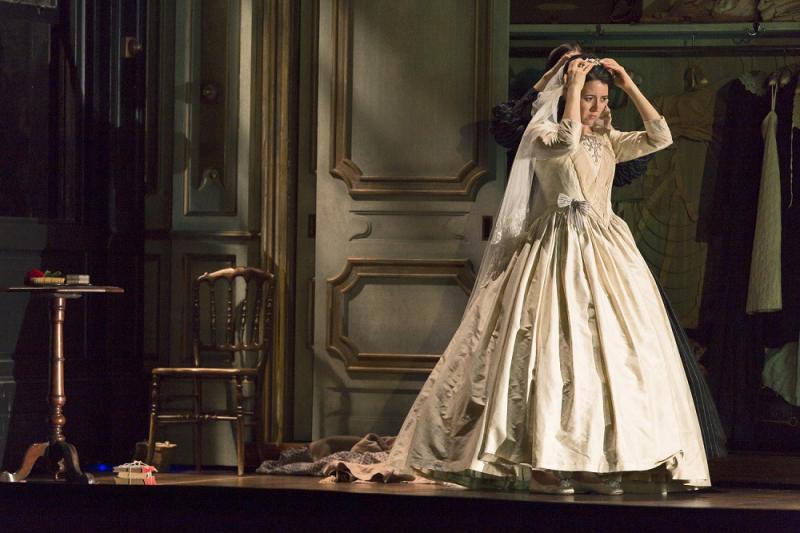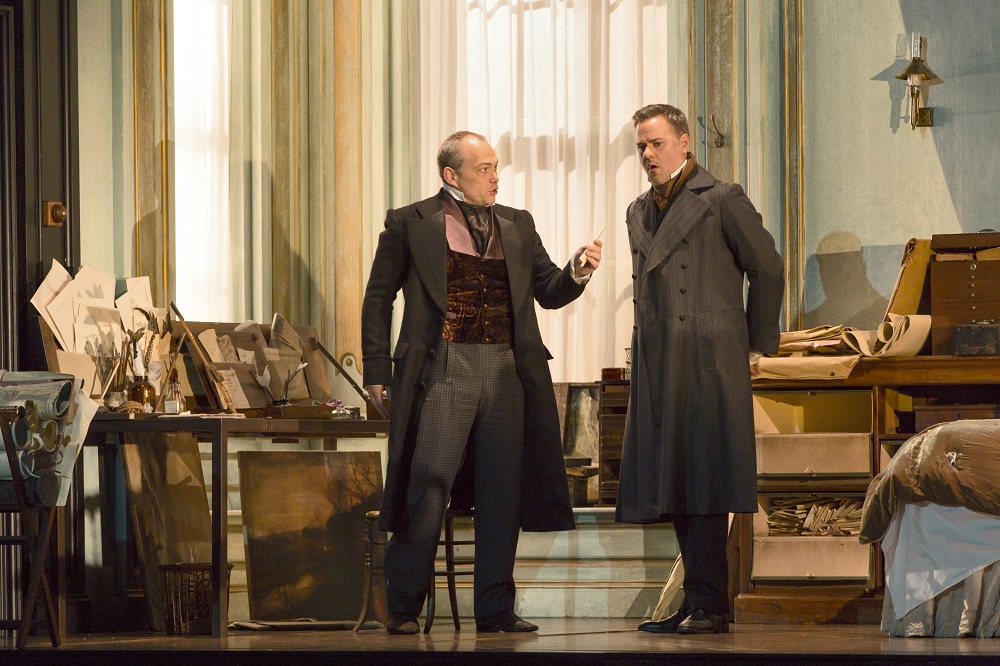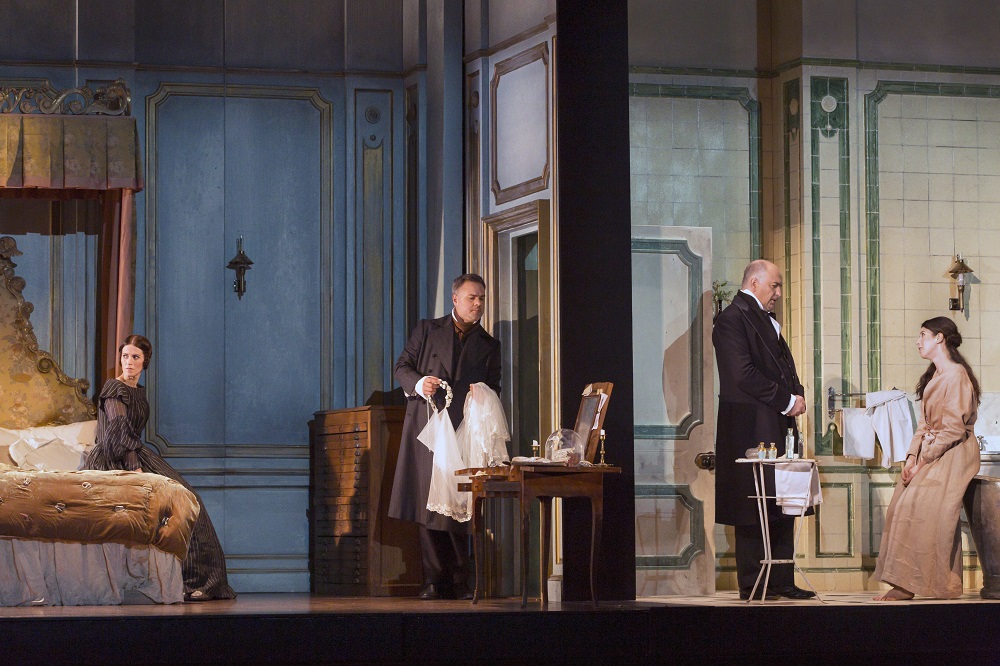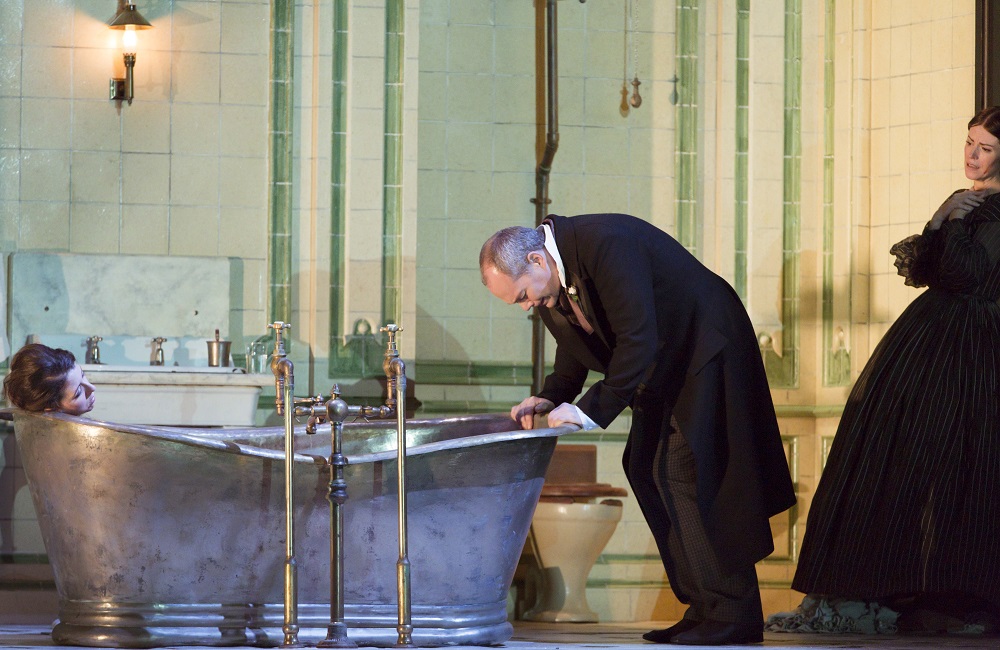Lucia di Lammermoor, Royal Opera review - creepy, violent and intense | reviews, news & interviews
Lucia di Lammermoor, Royal Opera review - creepy, violent and intense
Lucia di Lammermoor, Royal Opera review - creepy, violent and intense
Powerful staging returns in well-cast revival

Katie Mitchell’s production of Lucia di Lammermoor opened at Covent Garden in 2016 and now returns for a first revival. Royal Opera were clearly expecting great things, even from the start, and this is the third cast to have presented the show, after two separately cast runs last year, and a commercial DVD is also available.
Donizetti and his librettist, Salvadore Cammarano, based their 1835 opera on a recently published novel by Walter Scott. It is a story of love and betrayal in the Scottish Highlands: Lucia (Lisette Oropesa) is in love with Edgardo (Charles Castronovo), but he is the rival of her brother, Enrico (Christopher Maltman, pictured below with Andrew Tortise as Normanno), who forces her to marry Arturo (Konu Kim) to seal an alliance. Murder ensues, and madness, with the story spiralling into bloodshed and tragedy. In the libretto, much of the violence is unseen – Lucia’s murder of Arturo and her own suicide – but Mitchell and designer Vicki Mortimer take a different approach. The stage is divided throughout, on one side the public spaces in which the story plays out, and the other side Lucia’s private rooms. This allows the off-stage action to be graphically represented. The production has been described, both by Royal Opera publicity and by Mitchell herself, as feminist, and the opera itself has a strong feminist angle, in terms of Lucia’s agency and the consequences for all the male characters who attempt to control her life. But Mitchell makes an important stand by adjusting the gender balance of the cast. As the libretto stands, there are only two female singing roles, Lucia herself and her maid, Alisa (Rachel Lloyd pictured below, left). But at the opening of the opera, Lucia sees a vision of a ghost (Sacha Plaige), one of her ancestors murdered in the ongoing family feud.
The production has been described, both by Royal Opera publicity and by Mitchell herself, as feminist, and the opera itself has a strong feminist angle, in terms of Lucia’s agency and the consequences for all the male characters who attempt to control her life. But Mitchell makes an important stand by adjusting the gender balance of the cast. As the libretto stands, there are only two female singing roles, Lucia herself and her maid, Alisa (Rachel Lloyd pictured below, left). But at the opening of the opera, Lucia sees a vision of a ghost (Sacha Plaige), one of her ancestors murdered in the ongoing family feud.
Mitchell brings this ghostly apparition back in almost every scene. Lucia has also recently lost her mother (Sarah Northgraves), whose ghost too makes regular appearances. These are the sorts of additions that make up the second stage, suitably low-key but always suggestive. At the other end of the scale is the sadomasochistic murder of Arturo by Lucia and Alisa. An audacious twist to the story is Lucia’s pregnancy by Edgardo, and the murder is followed by an equally graphic miscarriage, a clever device, as it contextualises the mad scene that follows. Although there are nine named singing roles, most have very little music, placing heavy emphasis on the three leads, and all are superb here. Lucia is sung by Lisette Oropesa, here making her house debut. Her voice isn’t large, but she is a true coloratura soprano. She has excellent support for the long fioratura lines, and ideal agility for the runs and ornaments. Her Mad Scene (flutes here, no glass harmonica) is more about dramatic conviction than vocal acrobatics, but is no less impressive for it.
Although there are nine named singing roles, most have very little music, placing heavy emphasis on the three leads, and all are superb here. Lucia is sung by Lisette Oropesa, here making her house debut. Her voice isn’t large, but she is a true coloratura soprano. She has excellent support for the long fioratura lines, and ideal agility for the runs and ornaments. Her Mad Scene (flutes here, no glass harmonica) is more about dramatic conviction than vocal acrobatics, but is no less impressive for it.
The other outstanding voice is Christopher Maltman, making his role debut as Enrico (pictured below with Lisette Oropesa, left, and Rachael Lloyd, right). He’s the nearest the story has to an outright villain, and Maltman is a menacing presence throughout, both physically and vocally. Charles Castronovo, as Edgardo, is the only member of the original cast to return for the revival, though Ismael Jordi sings the role later in the run. Castronovo has a classic old-fashioned Italianate tenor (he’s actually American), bringing an air of tradition for those smarting at the innovations in the production. Michele Mariotti conducts with an innate sense of the bel canto style, never hurrying the singers but always maintaining the flow and dramatic tension, especially at the turbulent conclusion of the second act, which is particularly well paced. The chorus (in which all the women are dressed as men – a nice touch) are poorly served by the set, which always cramps them into a corner of the stage, but rise to the challenge; some poor ensemble in the opening number proved not to be indicative and they soon found their form. The orchestra looks unusually small but sounds suitably grand. Special mention for the principal flute, Margaret Campbell, and the harpist, Emma Granger, both on fine form for their respective solos.
Michele Mariotti conducts with an innate sense of the bel canto style, never hurrying the singers but always maintaining the flow and dramatic tension, especially at the turbulent conclusion of the second act, which is particularly well paced. The chorus (in which all the women are dressed as men – a nice touch) are poorly served by the set, which always cramps them into a corner of the stage, but rise to the challenge; some poor ensemble in the opening number proved not to be indicative and they soon found their form. The orchestra looks unusually small but sounds suitably grand. Special mention for the principal flute, Margaret Campbell, and the harpist, Emma Granger, both on fine form for their respective solos.
This is a gruelling Lucia di Lammermoor, creepy, violent and intense. But that’s how it should be, and this excellent production is fully deserving of a second showing, especially with such a fine revival cast.
rating
Explore topics
Share this article
The future of Arts Journalism
You can stop theartsdesk.com closing!
We urgently need financing to survive. Our fundraising drive has thus far raised £49,000 but we need to reach £100,000 or we will be forced to close. Please contribute here: https://gofund.me/c3f6033d
And if you can forward this information to anyone who might assist, we’d be grateful.

Subscribe to theartsdesk.com
Thank you for continuing to read our work on theartsdesk.com. For unlimited access to every article in its entirety, including our archive of more than 15,000 pieces, we're asking for £5 per month or £40 per year. We feel it's a very good deal, and hope you do too.
To take a subscription now simply click here.
And if you're looking for that extra gift for a friend or family member, why not treat them to a theartsdesk.com gift subscription?
more Opera
 Albert Herring, English National Opera review - a great comedy with depths fully realised
Britten’s delight was never made for the Coliseum, but it works on its first outing there
Albert Herring, English National Opera review - a great comedy with depths fully realised
Britten’s delight was never made for the Coliseum, but it works on its first outing there
 Carmen, English National Opera review - not quite dangerous
Hopes for Niamh O’Sullivan only partly fulfilled, though much good singing throughout
Carmen, English National Opera review - not quite dangerous
Hopes for Niamh O’Sullivan only partly fulfilled, though much good singing throughout
 Giustino, Linbury Theatre review - a stylish account of a slight opera
Gods, mortals and monsters do battle in Handel's charming drama
Giustino, Linbury Theatre review - a stylish account of a slight opera
Gods, mortals and monsters do battle in Handel's charming drama
 Susanna, Opera North review - hybrid staging of a Handel oratorio
Dance and signing complement outstanding singing in a story of virtue rewarded
Susanna, Opera North review - hybrid staging of a Handel oratorio
Dance and signing complement outstanding singing in a story of virtue rewarded
 Ariodante, Opéra Garnier, Paris review - a blast of Baroque beauty
A near-perfect night at the opera
Ariodante, Opéra Garnier, Paris review - a blast of Baroque beauty
A near-perfect night at the opera
 Cinderella/La Cenerentola, English National Opera review - the truth behind the tinsel
Appealing performances cut through hyperactive stagecraft
Cinderella/La Cenerentola, English National Opera review - the truth behind the tinsel
Appealing performances cut through hyperactive stagecraft
 Tosca, Royal Opera review - Ailyn Pérez steps in as the most vivid of divas
Jakub Hrůša’s multicoloured Puccini last night found a soprano to match
Tosca, Royal Opera review - Ailyn Pérez steps in as the most vivid of divas
Jakub Hrůša’s multicoloured Puccini last night found a soprano to match
 Tosca, Welsh National Opera review - a great company reduced to brilliance
The old warhorse made special by the basics
Tosca, Welsh National Opera review - a great company reduced to brilliance
The old warhorse made special by the basics
 BBC Proms: The Marriage of Figaro, Glyndebourne Festival review - merriment and menace
Strong Proms transfer for a robust and affecting show
BBC Proms: The Marriage of Figaro, Glyndebourne Festival review - merriment and menace
Strong Proms transfer for a robust and affecting show
 BBC Proms: Suor Angelica, LSO, Pappano review - earthly passion, heavenly grief
A Sister to remember blesses Puccini's convent tragedy
BBC Proms: Suor Angelica, LSO, Pappano review - earthly passion, heavenly grief
A Sister to remember blesses Puccini's convent tragedy
 Orpheus and Eurydice, Opera Queensland/SCO, Edinburgh International Festival 2025 review - dazzling, but distracting
Eye-popping acrobatics don’t always assist in Gluck’s quest for operatic truth
Orpheus and Eurydice, Opera Queensland/SCO, Edinburgh International Festival 2025 review - dazzling, but distracting
Eye-popping acrobatics don’t always assist in Gluck’s quest for operatic truth
 MARS, Irish National Opera review - silly space oddity with fun stretches
Cast, orchestra and production give Jennifer Walshe’s bold collage their all
MARS, Irish National Opera review - silly space oddity with fun stretches
Cast, orchestra and production give Jennifer Walshe’s bold collage their all

Add comment